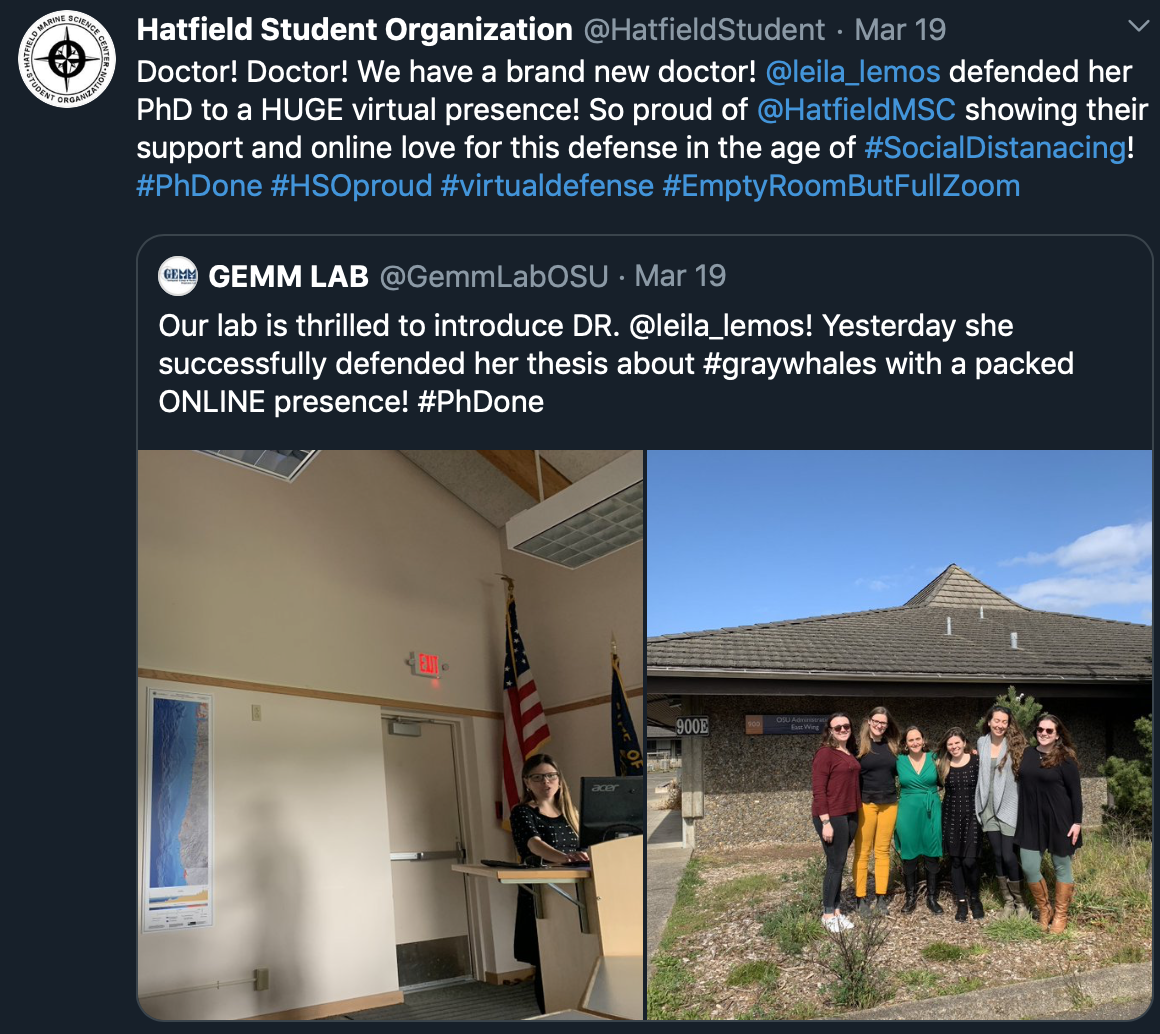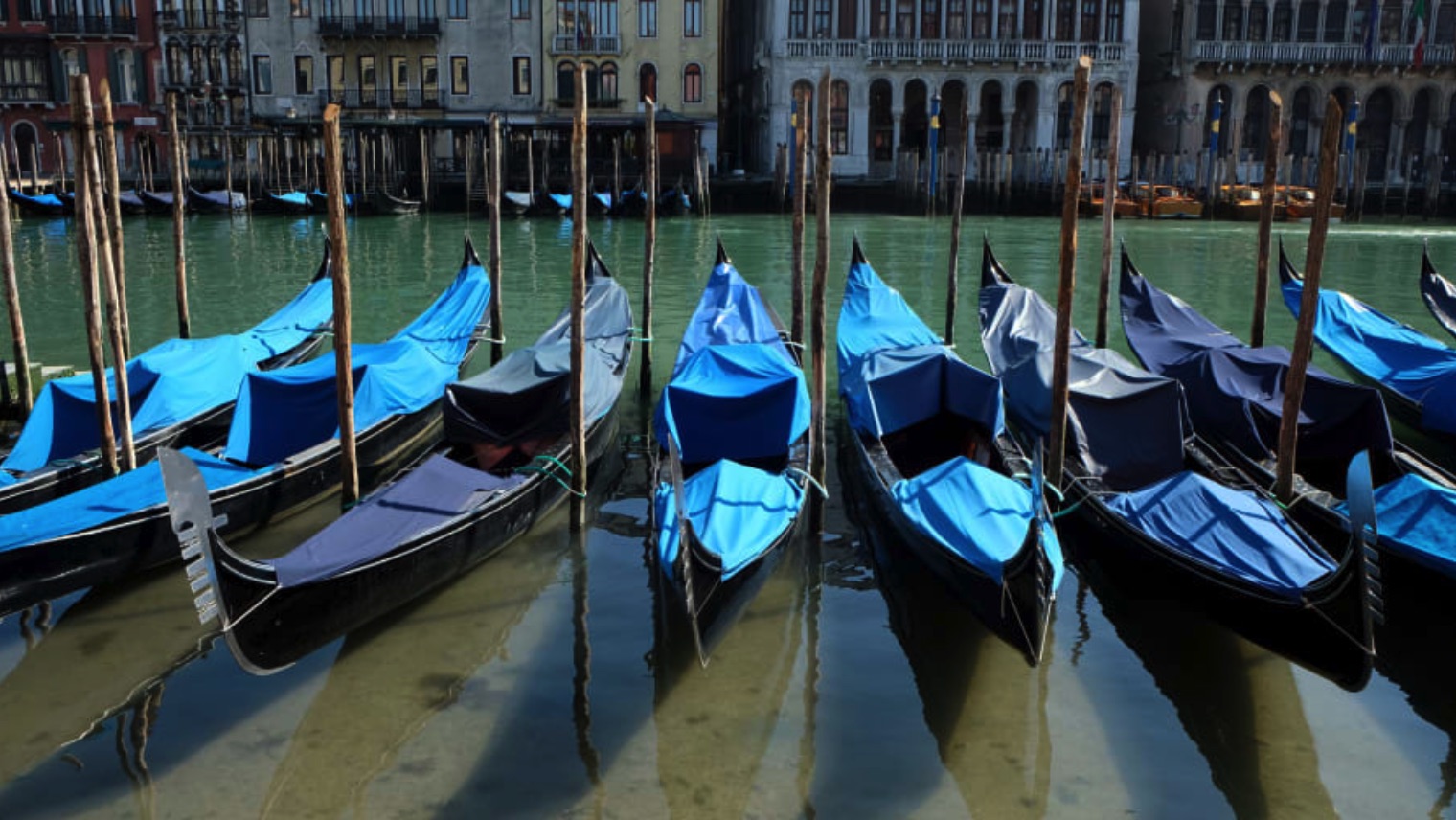By Leila Lemos, PhD (no more PhD candidate!), OSU Department of Fisheries and Wildlife, Geospatial Ecology of Marine Megafauna Lab
Did you read the byline above? Yes! I finally became a PhD last week and I will not be signing as a PhD candidate anymore. The past few months have been really challenging as I wrapped up my PhD, sent my written dissertation to my committee and synthesized all of the results of my four different chapters into a single presentation. On top of that I had family members visiting me for my defense in the middle of this whole coronavirus chaos.
For my PhD defense, everybody was encouraged to watch it online to help contain the virus spread. There were around 10 people in the room seated with at least two empty chairs between each other. I usually get a bit nervous with full rooms and public speaking, so that was a plus for me. However, I was delighted to hear that there were 61 people watching my defense online (Fig. 01), and I was thrilled to share the results of almost five years of research on this amazing project about gray whale body condition, hormones, and associations with ambient noise.

Source: Twitter (2020).
One of the questions I got from one of my committee members, Dr. Kathleen Hunt, in the closed-door session of my defense that actually motivated me to write this blog was: “what do I expect would happen to the whales during this coronavirus situation”. That made me think of the Rolland et al. (2012) article immediately, which looked into North Atlantic Right Whale (NARWs) cortisol responses to decreased ship traffic and ambient noise after the 9/11 event. Those authors found that NARWs decreased their overall cortisol (i.e., stress-related hormone) concentrations, supporting the theory that noise caused by ship traffic affects the physiology of these animals. Thus, I would expect the same to occur with gray whales in the Pacific northwest. If vessel activities in general are reduced, we can expect a quieter and cleaner environment, which would allow the animals and overall nature to “breath”.
In fact, multiple news stories over the last days have pointed out declines in air pollution (Fig. 02) and cleaner waters with no boat traffic (Fig. 03), which demonstrate how poorly we treat the environment during “normal” times.

Source: NASA (2020).

Source: Newburger (2020).
It is impressive to see how fast nature can take back what we, humans, have been taking from it. In addition, there were lots of photos that went viral on Twitter of animals returning to urban areas, including fish swarms, swans, dolphins, and wild boars. Even though there are reports saying that the apparition of some of these animals is fake (Daly 2020), it definitely can make us all reflect on how dense tourism, boat traffic, and overall anthropogenic activities impacts and changes the environment. Perhaps once this coronavirus scare is over people may act in ways that better balance these activities with also allowing our planet to keep breathing.
Here you can see some of these tweets:
https://twitter.com/ikaveri/status/1239660248207589383?s=20
Venice hasn't seen clear canal water in a very long time. Dolphins showing up too. Nature just hit the reset button on us https://t.co/RzqOq8ftCj
— Luca (@lucadb) March 17, 2020
The Guardian also added a video showing some of these cases:
Source: Guardian News (2020).
In a near future, it will also be a great moment for researchers to evaluate potential shifts in ecosystem pollution, flora, and evaluate physiological responses in bioindicator species to inform management and conservation efforts, setting up potential thresholds for these activities. As I mentioned before, I worked with gray whale body condition, hormone quantification, and associations with ambient noise in my PhD project. I explored an association between cortisol levels and ambient noise, and now, with a reduction in overall vessel traffic, would be an ideal moment to see if cortisol levels would decrease in this population. The problem is that we are not able to leave our houses for now to do research. But maybe other variables can be evaluated once this chaos passes. Maybe it will be reflected in individual body condition and reproductive rates, maybe we will see fewer signs of fisheries interactions, or maybe we just need to be creative and think of other possible ways.
Efforts to identify these potential changes and setting up thresholds for these activities may aid in building a planet that will be in equilibrium, and maybe declines in air pollution, and clearer waters will be more common and the apparition of species in urban areas will not be fake news.
References:
Daly, N. 2020. Fake animal news abounds on social media as coronavirus upends life. National Geographic. Accessed on 03/23/2020 at https://www.nationalgeographic.com/animals/2020/03 /coronavirus-pandemic-fake-animal-viral-social-media-posts/#close
Guardian News. 2020. Dolphins and fish: nature moves into spaces left empty by Italian coronavirus quarantine. Accessed on 03/23/2020 at https://www.youtube.com/watch?time_ continue=89&v=jv0DLTVfwIc&feature=emb_logo
NASA. 2020. Airborne Nitrogen Dioxide Plummets Over China. Earth Observatory NASA. Accessed on 03/23/2020 at https://earthobservatory.nasa.gov/images/146362/airborne-nitrogen-dioxide-plummets-over-china
Newburger, E. 2020. Air pollution falls as coronavirus slows travel, but scientists warn of longer-term threat to climate change progress. CNBC. Accessed on 03/23/2020 at https://www.cnbc. com/2020/03/21/air-pollution-falls-as-coronavirus-slows-travel-but-it-forms-a-new-threat.html
Rolland, R. M., S. E. Parks, K. E. Hunt, M. Castellote, P. J. Corkeron, D. P. Nowacek, S. K. Wasser, and S. D. Kraus. 2012. Evidence that ship noise increases stress in right whales Proceedings of the Royal Society B 279:2363–2368.

Congratulations and an interesting topic. Best wishes on your continuing whale endeavors!
Thank you 🙂